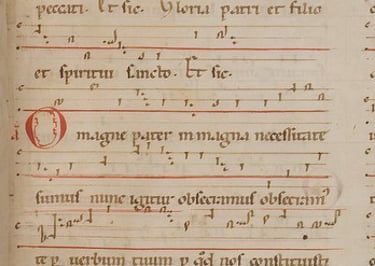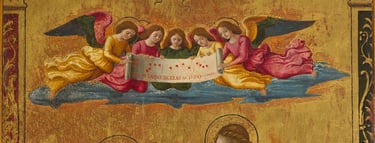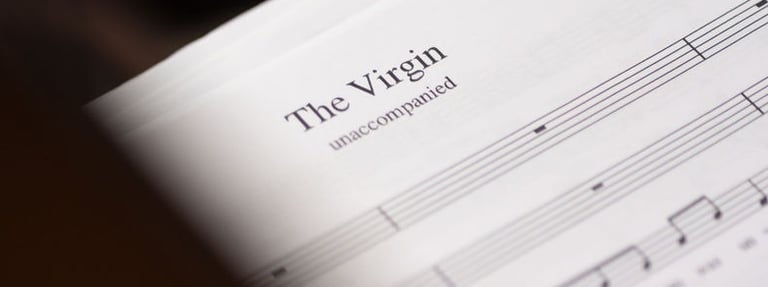
Polyhymnia’s repertoire spans the musical history of the Church, from 4th century Gregorian chant to works by living composers engaging with the Catholic tradition. We sing both a cappella (unaccompanied) as well as accompanied works, with preference for organ.
As choral singing has historically been a man's (or boy's) endeavor, there is a dearth of music written for solely female choirs. One of our aims is to promote modern women's choral pieces as well as adapt works written originally for men, elevating Tradition with the special touch of femininity.
Our Music

“The musical tradition of the universal Church is a treasure of inestimable value, greater even than that of any other art.”
Vatican Council 2, The Constitution of The Sacred Liturgy, 1963, 112.

O Magne Pater
St. Hildegard von Bingen
Soloist: Elena Farel
A cappella with drone
Highlight: Hildegardian Chant
Form: Chant
Composer: Hildegard von Bingen, saint and mystic
Period: 12th century
Style: Unaccompanied, free-flowing expressions of scripture and original prayers
O Magne Pater,
in magna necessitate sumus.
Nunc igitur obsecramus, obsecramus te
per Verbum tuum
per quod nos constituisti
plenos quibus indigemus.
Nunc placeat tibi, Pater,
quia te decet, ut aspicias in nos
per adiutorium tuum,
ut non deficiamus, et
ne nomen tuum in nobis obscuretur,
et per ipsum nomen tuum
dignare nos adiuvare.
O Father great,
in great necessity we are.
Thus we now beg, we beg of you
according to your Word,
through whom you once established us
full of all that we now lack.
Now may it please you, Father,
as it behooves you—look upon us
with your kindly aid,
lest we should fail again
and, lost, forget your name.
By that your name we pray—
please kindly help and bring us aid!





Adoration of the Child, Domenico Bigordi (Ghirlandaio), c. 1492, Vatican Museums 40344

The Virgin
Text by William Wordsworth,
Arranged by Rose Fulton (Polyhymnia member)
3-part a cappella
Highlight: Modern Compositions
Form: Various
Composers: Polyhymnia members, local musicians, and other living artists
Period: 20th - 21st centuries
Style: Accompanied and unaccompanied works for multiple voices, usually comprising many parts with intricate harmonies
Mother! whose virgin bosom was uncrost
With the least shade of thought to sin allied.
Woman! above all women glorified,
Our tainted nature's solitary boast;
Purer than foam on central ocean tost;
Brighter than eastern skies at daybreak strewn
With fancied roses, than the unblemished moon
Before her wane begins on heaven's blue coast;
Thy image falls to earth. Yet some, I ween,
Not unforgiven the suppliant knee might bend,
As to a visible Power, in which did blend
All that was mixed and reconciled in thee
Of mother's love with maiden purity,
Of high with low, celestial with terrene!



(857) 272-0076
director@polyhymniastl.org
Polyhymnia is a 501(c)(3) organization. All donations are tax-deductible.
Nonprofit Tax ID: 61-2116264
